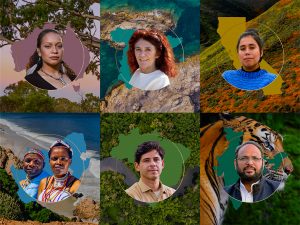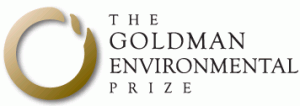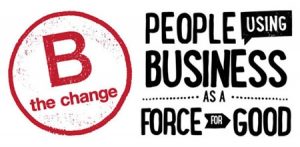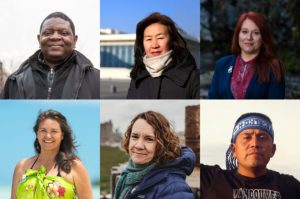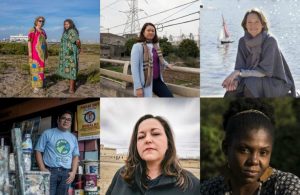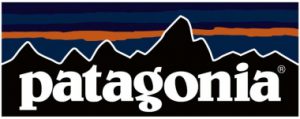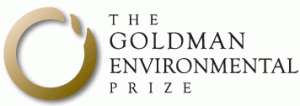 The Goldman Environmental Prize is the world’s largest and most prestigious annual award for grassroots environmentalists. Some people refer to it as the “green Nobel.” Goldman Prize winners are models of courage, and their stories are powerful and truly inspiring. “The Prize recognizes individuals for sustained and significant efforts to protect and enhance the natural environment, often at great personal risk. Each winner receives a financial award. The Goldman Prize views ‘grassroots’ leaders as those involved in local efforts, where positive change is created through community or citizen participation in the issues that affect them. Through recognizing these individual leaders, the Prize seeks to inspire other ordinary people to take extraordinary actions to protect the natural world.” Over the 36 years that the Prize has been awarded, there have been 226 recipients of the prize.
The Goldman Environmental Prize is the world’s largest and most prestigious annual award for grassroots environmentalists. Some people refer to it as the “green Nobel.” Goldman Prize winners are models of courage, and their stories are powerful and truly inspiring. “The Prize recognizes individuals for sustained and significant efforts to protect and enhance the natural environment, often at great personal risk. Each winner receives a financial award. The Goldman Prize views ‘grassroots’ leaders as those involved in local efforts, where positive change is created through community or citizen participation in the issues that affect them. Through recognizing these individual leaders, the Prize seeks to inspire other ordinary people to take extraordinary actions to protect the natural world.” Over the 36 years that the Prize has been awarded, there have been 226 recipients of the prize.
This year’s prize recipients (representing each of the six inhabited continental regions of the world) are:
- Laurene Allen—USA: “When one of the largest environmental crises in New England’s history was exposed in her own community, Laurene Allen stepped up to protect thousands of families affected by contaminated drinking water. Laurene’s campaign pressured the Saint-Gobain Performance Plastics plant—responsible for leaking toxic forever chemicals into community drinking water sources—to announce its closure in August 2023. The plant’s closure in May 2024 marked an end to more than 20 years of rampant air, soil, and water pollution.” (Support/follow: National PFAS Contamination Coalition; Laurene Allen on Bluesky; Merrimack Citizens for Clean Water)
- Mari Luz Canaquiri Murayari—Peru: “In March 2024, Mari Luz Canaquiri Murayari and Asociación de Mujeres Huaynakana Kamatahuara Kana—a Kukama women’s association for which she serves as president—won a landmark rights of nature court decision to protect the Marañón River in Peru. For the first time in the country’s history, a river was granted legal personhood—with the right to be free-flowing and free of contamination. After finding the Peruvian government in violation of the river’s inherent rights, the court ordered the government to take immediate action to prevent future oil spills into the river, mandated the creation of a basin-wide protection plan, and recognized the Kukama as stewards of the river.” (Support/follow: Huaynakana Kamatahuara Kana on Facebook; International Rivers; Instituo de Defense Legal)
- Carlos Mallo Molina—Canary Islands: “Carlos Mallo Molina helped lead a sophisticated, global campaign to prevent the construction of Fonsalía Port, a massive recreational boat and ferry terminal that threatened a biodiverse 170,000-acre marine protected area in the Canary Islands. Proposed to be built on the island of Tenerife, the port would have destroyed vital habitat for endangered sea turtles, whales, and sharks. In October 2021, because of the campaign, the Canary Islands government officially canceled the port project. In lieu of the port, Carlos is now realizing his vision for a world-class marine conservation and education center—the first of its kind in the Canary Islands.” (Support/follow: Innoceana; Carlos Mallo Molina on LinkedIn)
- Semia Gharbi—Tunisia: “Semia Gharbi helped spearhead a campaign that challenged a corrupt waste trafficking scheme between Italy and Tunisia, resulting in the return of 6,000 tons of illegally exported household waste back to Italy, its country of origin, in February 2022. More than 40 corrupt government officials and others involved in waste trafficking in both countries were arrested in the scandal. Her efforts spurred policy shifts within the EU, which has now tightened its procedures and regulations for waste shipments abroad.” (Support/follow: Association for Environmental Education for Future Generations; International Pollutants Elimination Network (IPEN); GAIA)
- Besjana Guri and Olsi Nika—Albania: “Besjana Guri and Olsi Nika’s campaign to protect the Vjosa River from a hydropower dam development boom resulted in its historic designation as the Vjosa Wild River National Park by the Albanian government in March 2023. This precedent-setting action safeguards not only the entirety of the Vjosa’s 167 miles—which flow freely across Albania—but also its free-flowing tributaries, totaling 250 miles of undisturbed river corridors. The Vjosa ecosystem is a significant bastion of freshwater biodiversity that provides critical habitat for several endangered species. The new national park is both Albania and Europe’s first to protect a wild river.” (Support/follow: EcoAlbania and their YouTube channel)
- Batmunkh Luvsandash—Mongolia: “Determined to protect his homeland from mining, Batmunkh Luvsandash’s activism resulted in the creation of a 66,000-acre protected area in Dornogovi province in April 2022, abutting tens of thousands of acres already protected by Batmunkh and allies. Home to Argali sheep, 75% of the world’s population of endangered Asiatic wild ass, and a wide variety of endemic plants, the protected area forms an important bulwark against Mongolia’s mining boom.” (Support/follow: The Nature Conservancy’s work in Mongolia)
Click on each recipient’s name to read a longer profile—or watch a brief video—about their remarkable efforts and achievements.
Posts on Goldman Prize winners from previous years:
- Goldman Prize Winners, 2024
- Goldman Prize Winners, 2023
- Goldman Prize Winners, 2022
- Goldman Prize Winners, 2021
- Goldman Prize Winners, 2020
- Goldman Prize Winners, 2019
- Goldman Prize Winners, 2018
- Goldman Prize Winners, 2017
- Goldman Prize Winners, 2016
- Goldman Prize Winners, 2015
- Goldman Prize Winners, 2014
- Goldman Prize Winners, 2013
- Goldman Prize Winners, 2012
- Goldman Prize Winners, 2011
- Goldman Prize Winners, 2010


